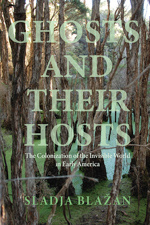Today, we are happy to bring you our conversation with Sladja Blažan, author of Ghosts and Their Hosts: The Colonization of the Invisible World in Early America
What inspired you to write this book?
I came to ghosts via migration studies. I was drawn to migrant writing that attends to the irrational, the animist, the ecological and I realized that ghosts play an important role in such narratives. It is extremely helpful when expressing the presence of the past in the future. Ghosts speak for us when no other way of talking seems possible. Yet, I quickly realized that every culture and every period in history has had their fair share of ghosts. So, in fact, it’s a transcultural concept that connects us all. That makes it extremely powerful.
What did you learn and what are you hoping readers will learn from your book?
I learned to appreciate how writing or story-telling in general contains a multiplicity of voices that all rattle and shuffle around and the writer inscribes themselves into this cacophony rather than ordering it. I became more attentive to the multiplicity of voices within one’s own voice. So, I learned to look for ways of telling stories without leaning towards a moral center. Morality, as I see it after writing this book, is a highly problematic concept. I learned not to expect from characters to act as individual entities but rather to look for their embeddedness within larger frameworks. Ghost are wonderful for decentering the human.
What surprised you the most in the process of writing your book?
I grew up thinking that ghosts are something that people with bad taste believe in and films with bad directors use to scare the audience. I was very surprised to find out that both of these theories are completely wrong. Ghosts do not relate to questions of belief or disbelief. People relate to ghosts often in times of need and it is a helpful concept for both, revealing and occluding, mourning and discriminating, laughing and crying. Ghosts are wonderful companions, not only for those who are lonely but also for those who want more power over those who are lonely. I was surprised to see how much we structure our society around ghosts even today.
What’s your favorite anecdote from your book?
Many really funny tales that I read in Puritan texts. For example, a story about “a noble person” who was seen while going in and out of “an empresses’ chamber” at night is explained to not have been there, only a “daemon in his shape.” This was at a time when Puritans where promoting the idea that bodies could be possessed by the devil and made to do certain things. It is, perhaps, not a surprise that many of those “certain” things were sexual. Unfortunately, they also cover stories of abuse, so this part was not so much fun anymore. But it does demonstrate nicely how important it is to attend to our ghosts.
What’s next?
I am writing a book on intersubjectivity, how to account for a shared narrative perspective, particularly one that involves the nonhuman. Right now millions of microbes in my body, my ancestors, the food that I have digested as well as the films that I have watched are all answering the questions that you are asking me. I find this fascinating. My perspective is a conglomeration of many. So I spend a lot of time thinking about perspective. I believe that the nonhuman will revolutionize the way we tell stories. I hope so. Because we do need a revolution!





